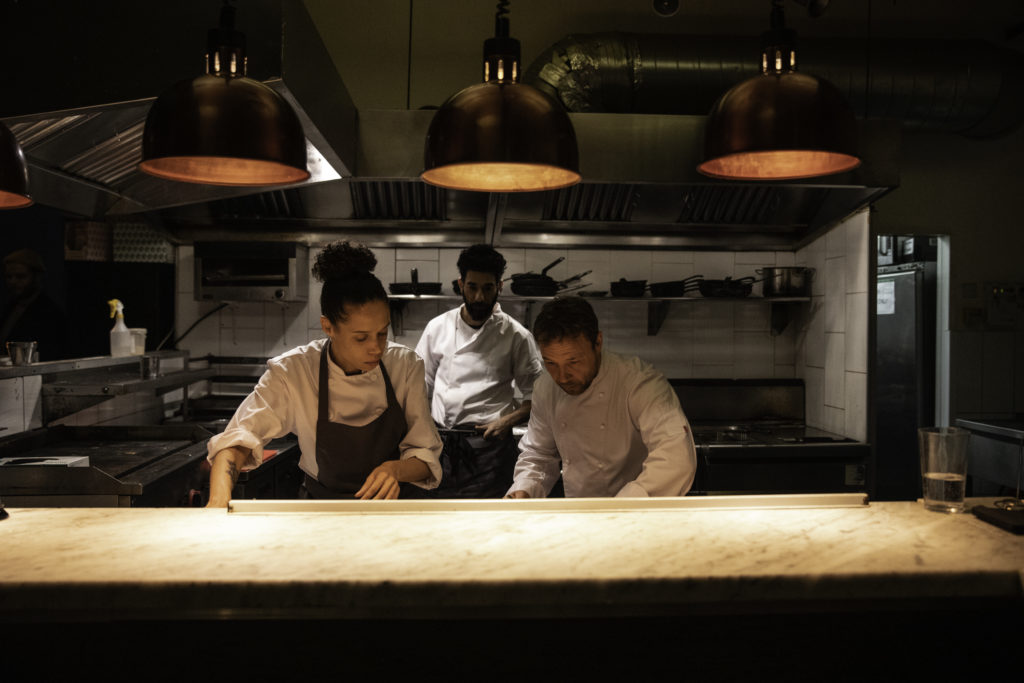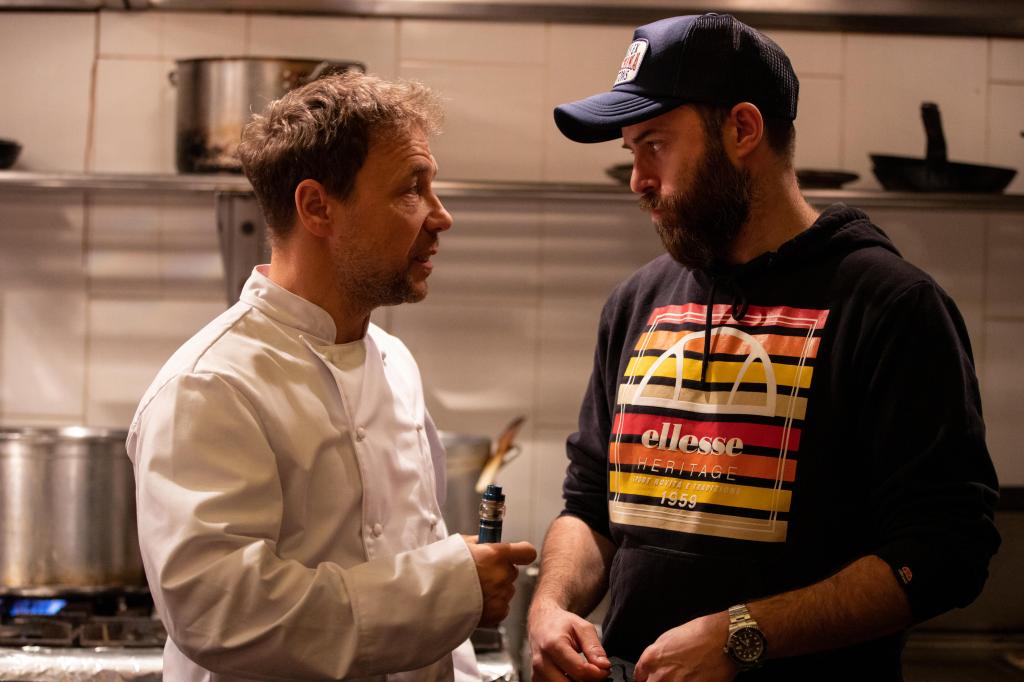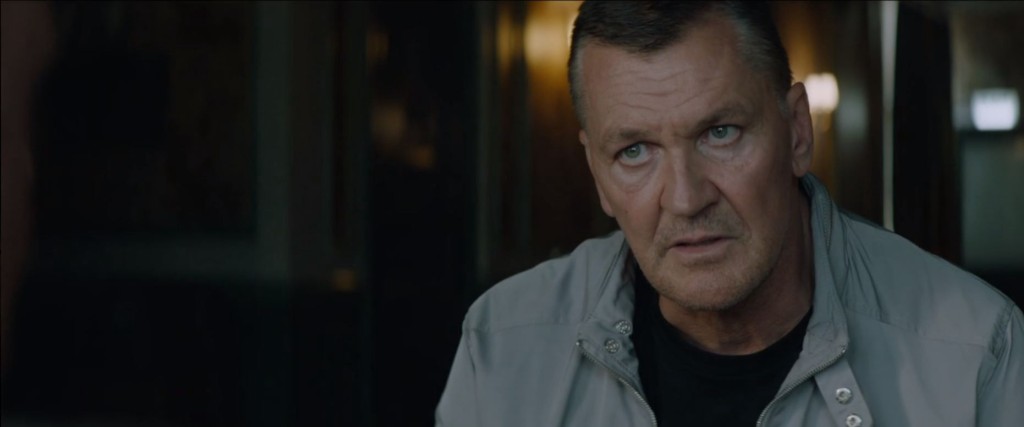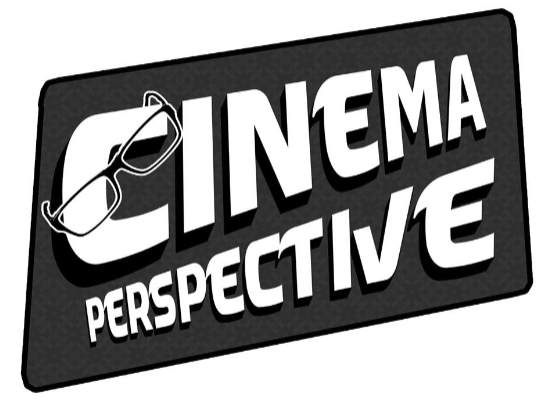
Filmmaker Philip Barantini combined his experience working in busy kitchens with his time as an actor to craft his latest feature Boiling Point. It’s all shot in one continuous take and centres around a head chef played by Stephen Graham during a hectic evening at a high-end London restaurant. I was fortunate enough to chat with the director about the process of making this ambitious film…
I’m sure this is what everyone is asking about but as if getting a film made wasn’t hard enough in the current climate, you decide to do it in one take. Where did the decision behind this come from and are there any other one-take films that influenced this style choice?
Well, we did a short in the back end of 2018, and we did that all in one take. That was just 20 minutes. I’ve seen Victoria, Russian Ark, and movies like that so I knew it could be done. For me, the reason we did it in one take I think is because I wanted to throw the audience into that perspective of being in a busy restaurant, over that period of time and almost like making the audience the voyeur, and it added that extra layer of tension. I wanted the audience to maybe forget halfway through that it was a one take and be like ‘Oh my god!’ when they realise. Someone said to me the other day, which is the best comment I could ever get, that they hadn’t realised it was one take and that they’d need to watch it again!
I knew that it was one take going in and was quite conscious of it at the beginning, but you kind of get immersed in that environment and don’t think about it after a while…
That’s it exactly. An immersive experience is what we wanted to go for, you know, but it was tough. I think because we had the short as a proof of concept, we could show that to financiers and as soon as Stephen Graham said he wanted to do it, it was easy to get the money together. It’s not a huge budget but we didn’t need a huge budget. In movies usually you’ve got between 8-10 weeks or whatever to shoot, but this was all going to be shot in real time. The plan was to shoot it twice per day and we gave ourselves four nights to do it over, but we ended up getting shut down by COVID two days in, so we only did it four times. When you think about it that way, in terms of the crew, the location, the supporting artists, we only needed those four days really!
The camera movements work really well in the location, swirling around and going through the back then coming back and out to the front of the restaurant. What were the biggest challenges just in terms of the logistics of that and how it all worked?
The first challenge was to find the right camera. For example, for Victoria, they used a small C300 camera which is really lightweight. We could have done that, but I wanted it to be as filmic as possible. We found out that Sony had this camera called the Venice out for a little while, and two amazing things about the Venice are…especially for our film… was that you’re able to remove the sensor and the lens from the main body of the camera, and it’s connected through a wire basically. That enabled us to design a rig for Matt Lewis (cinematographer) to put the camera body on his back. He had what’s called an easy rig which is like a metal arm that goes over the top of you with a bungee cord on it. The weight is distributed evenly across his body. The second amazing thing about the Venice is that you can live swap SD cards.
We then found the location and we wrote the script around that location, which belongs to a very, very good friend of mines. It’s his restaurant in Dalston called ‘Jones and Sons’, so we kept the name and we named Stephen’s character after him. We went to the location pretty much every day for three weeks and we’d go through all of the moves together and I would be there playing every part. It was like a choreographed dance really. We decided to give ourselves two rules; the camera should never repeat a move and also the camera is never allowed to float off on its own, and just do its own thing. It always be motivated by a person. It was all about getting that choreography right and Matt Lewis is just an incredible tour de force. He’s young and fit and he was able to remember all the moves. He’s incredible and would add little things like, for example, he’d do like a slight tilt on the camera when Stephen’s mental state was a bit off. Just tiny things like that which are so intuitive. He is so focused, and he feels it as well.
I’d read during my research that you worked in kitchens for years. What do you think it is about that restaurant environment that translates well for the big screen?
I started out as an actor about 25 years ago, but I needed to make some money in the nights. When I first moved to London, I was doing really well as an actor, and you know, it’s great, but then I got quite complacent. I was partying a lot, not going to auditions and I needed to earn some money. I started working in kitchens because I was really passionate about food and my grandfather was a chef, my cousin is a chef and I wanted to do something creative. I did it for 12 years and I worked from the bottom all the way to the top and became a head chef in several different places. During that time, I’d just see the drama and the incredible highs and lows and I always thought this could be explored. I’d watched movies and some TV set in that world, and it just didn’t quite hit the mark for me in terms of what I had witnessed and experienced. I thought you know I’m going to give it a shot and maybe try and bring my truth to that world. It’s not everybody’s experience of working in that world but it certainly is mine.
I struggle if I’ve got more than two pots on the stove at once so I can’t imagine the panic of that job. Boiling Point is the latest in a resurgence of stress-porn cinema along with the likes of Uncut Gems or Surge. Was the vision going in to cause this dread and anxiety for the viewer?
Yeah, absolutely! You mentioned Uncut Gems which is one of my favourite films of all time now! We talked about how we would create that tension and that stress because it is a tense environment, and I wanted the audience to go through that. We’re just in one location like we said before and when you work in that environment, it’s incredibly volatile and intense and you just don’t know what’s going to happen next or who’s going to walk in the door. You open yourself to anything really so that was definitely at the forefront when we when we were writing it and because of the one take thing, I didn’t want it to become boring. When we did the short, we started at a 10 (level of tension) and we end on 10 but it’s only 20 minutes long so you can sort of put the audience through that. With this I felt like if we start at 10 then there’s nowhere to go. So, with Stephen’s character in the short, he’s really high energy, shouting all the time and running about the place but with the feature I felt like it needed to start somewhere else and then build to that.
That whole opening section with Thomas Coombes coming in as the hygiene inspector is great. Stephen Graham’s expression is so good. He just doesn’t have the patience for it, and you can already tell that he’s in for a bad night.
Yeah, exactly. He starts off on the wrong foot.

Of course, there always has to be a lot of trust on set but that would seem even more integral given the one take element of the shoot. I noticed lots of little connections between the cast from previous films or TV shows such as you and Stephen Graham having worked on Band of Brothers together or a little reunion of the cast of Save Me. Did these shared histories help on set for this piece?
Absolutely! One of the things I said to Stephen when we first decided we’re going to do the feature was that it’s really important that you cast a lot of people, especially the kitchen staff, because him as a head chef, he would have employed all of these people. It’s really important that you have that relationship with these people already, so we went through lists of people that he’d worked with before and recommended, and so I had meetings with them all and that’s how it came about. When Stephen Graham says, ‘I recommend this person’, you’re going to take them on because he’s had a great track record…look at Jodie Comer for example! With the rest of the cast, what was important was to be able to cast people who can be on the same level as Stephen and be confident enough to go toe to toe with him. Not just with him, but with Vinette Robinson and the others. I wanted to bring back a couple of people from the short like Alice Feetham for example. She played the manager in the short and I thought she was absolutely incredible so that was a no brainer.
The first thing I asked the casting director Carolyn McLeod, who is just a genius – she’s amazing, was ‘let’s get people to just tell me a story about the best and the worst time they’ve had in a restaurant whilst making a cup of tea or coffee’. You’d be surprised at the number of actors that would rehearse this story in a character, and then stir a cup with no liquid in it and just pretend sip, and you’re like, ‘that’s not what I wanted you to do’. I wanted them to just be in the moment and be themselves. But then I would add a friend of mine, Robbie O’Neill, who actually wrote the very first short that I ever directed. He was in the shorter Boiling Point as well, but also, he was in the feature. I brought him in to do some improv with the actors. I’d whisper notes in his ear and be like ‘Okay, I want you to tear them a new arsehole and go to town’. They didn’t know what to expect. I just gave them some props, for example ‘here’s some pots and pans in the kitchen – you’re doing your prep’, and then Robbie will come in and it’d be fight or flight. That’s how we sort of cast it and we wanted to get the right people so I was so confident going into it that they would all be amazing when it comes to working with Stephen.
I think what you said hit the nail on the head for me that the head chef would have hired everyone around him. You get that feeling that the team is really connected.
It’s a family, right? If anyone’s ever worked in that industry, you know, whether it be front of house or back of house, you spend more time with this family than you do with your actual family usually, which is a big downfall for a lot of chefs and managers. I would finish work and then think, ‘Oh, I deserve a drink now’, then you end up going out, staying up until all hours and not coming home and all this kind of stuff.
Going back to Stephen Graham for a bit…I’ve been a big, big fan of his work for years and years. What is he like to work with and what do you think he’s got that’s special and making what seems like every British production cast him right now?
We’ve been friends for about 20 years, and he’s just got this aura about him, which makes you instantly fall in love with him. He’s a genuine, genuine human being who genuinely wants to help people. He’s in a fortunate position where he can pick and choose what he wants to take now so he’s not just going to take anything. I think for him, it’s about the characters and I just think once he’s locked into something, he is all in. When we were doing Boiling Point, we’d be on the phone every day talking about characters and talking about his character and we’d both be bouncing ideas off each other. He’s so enthusiastic, passionate, and he loves what he does. He just loves it.
I can’t speak for any of the other directors but for me, personally, you almost don’t direct him. Unless there’s something where you’ve just got to sort of nudge him in a direction or whisper in his ear to try something. You’ve just almost got to let him go and do his thing because that’s when you get the best out of him.
I was lucky enough to interview him five years ago for a film called A Patch of Fog and he’d just recently filmed some of Boardwalk Empire. The variety of his work is amazing because not many actors would go off and do a huge Hollywood film like Gangs of New York then come back and act in little intimate dramas like he does, but he gives everything 100%
Yeah, that’s the thing. He’s not somebody who’s now going to Hollywood and will only now do big productions. It’s all about the characters for him and something new as well. He wants to try new things all the time. There was a point in his career where I think he was playing baddies all the time around the time of This is England. He got offered lots of characters similar to that, but he wants to just play, and if it’s something that challenges him then he’s all for it, you know what I mean?
Do you think being an actor yourself informs the way in which you direct?
I think subconsciously, yeah. When I was acting, I was very interested in directing but I never really had the confidence to make the leap. I just thought I’m just some kid from Huyton, a small town near Liverpool. You always think of directors being educated people who went to film school, and they know everything about it. But actually, what I’ve learnt is that you don’t need to know everything. Yeah, you need to understand a bit about everybody’s job and what they’re there for, but I had always been really passionate and enthusiastic about that when I was on set as an actor.
I asked Bart Ruspoli, who produced Boiling Point and my previous film, if he could recommend any film schools. He said ‘Mate, you’ve been in film school for the last 25 years. What are you talking about? You know how it all works, right?’ I thought ‘I do actually, yeah!’ I do understand actors. They can be very sensitive, and each individual actor is different as well, they have a different approach in the way they work. I would say I’m an actor’s director, you know, but I also know what I like to look at. I know this because I’ve worked with Matt Lewis on everything I’ve done so far, and I’d love to continue that because Matt and I have a shorthand. He knows what I like, it’s as simple as that. At the end of the day, this is the best job in the world. We’re playing every day we’re making things and you know, it’s just it’s the most incredible job in the world for me and I love it.
I see that you’re still acting as well and have a part coming up in a prison film called Ire. What can you tell me about that at this stage?
It’s so funny because I‘d made a conscious decision that I was probably going to phase out acting for a while because the directing side of it was taking over. I signed with an agency in the UK and then I’ve recently signed with a big agent in LA as well. I thought ‘I need to focus on this’ and then as soon as you say that you start getting offers for acting jobs! Bart Ruspoli who I’d mentioned earlier produced it and asked if I wanted to come down for a few days so I did that, and then the same thing happened with a little part in Time which Stephen was in. That was all set in Liverpool and Lewis Arnold, who’s an amazing director is a good friend of mine said ‘let’s do this’. I taped for that and got a small part which was an amazing experience. I just directed an episode of The Responder for BBC One which is a drama starring Martin Freeman that’ll be out next year. They offered me a part in it but then offered me to direct the last episode and I was like ‘Oh shit, this is the first time I’m going to have to direct myself’ It was a weird experience but that was probably the last acting job I’ll do it for a little while.

I’d heard Craig Fairbrass talking about Ire recently, who I know you directed in Villain. He’s such a good actor – what was it like working with him?
Craig’s a fantastic actor. He’s so underrated and doesn’t get the recognition he deserves. He is of a certain stature, and he looks a certain way, so he plays those hardman roles…but underneath all that is a really wonderful actor and a wonderful human being. Craig and I are really close now.
A fun one to finish up; if you could choose three people to act with or direct in your dream film, either from the past or present, who would they be?
So, Sam Rockwell 100% to direct, or to act alongside – I wouldn’t be fussy! Oh, my gosh, that’s a great question…there’s so many. Ann Dowd! She’s a wonderful actress in Handmaid’s Tale, but she’s been in a bunch of movies. She’s in Mass with Jason Isaacs, which is on at the London Film Festival too…and the third would be Denzel Washington!
What a trio! I’d asked Stephen Graham a similar question and he mentioned wanting to work with Jim Broadbent…
Well, you know what, funny enough actually…I was writing in lockdown and said to Stephen that I wanted to write a TV thing with him in mind and I asked him who he’d want to be alongside, and he said exactly that!
Check out my review of Boiling Point here! It’s now streaming on Netflix!


One thought on “Boiling Point Interview: Philip Barantini – ‘I wanted to make the audience the voyeur, and it added an extra layer of tension’.”